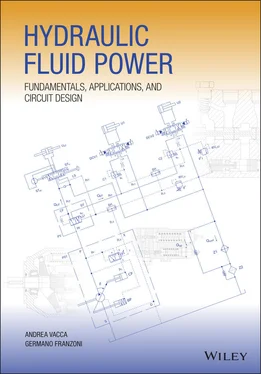Source: Adapted from Zarotti [8].
2.2.3 Synthetic Fluids (HS)
ISO 6473 specifies the acronym for HS synthetics fluids, without further specifying their composition. Usually, these fluids are developed for specific applications. A typical example is the case of extreme temperature conditions. The technology for HS fluids is continuously evolving, and the number of options today available is too high to be summarized in a short list. Nevertheless, many current HS fluids are based on silicate esters and polyol esters.
2.2.4 Environmentally Friendly Fluids
In certain applications there is an increasing preference for using fluids that are environmentally friendly. In particular, a significant effort has been put in developing fluids that are highly biodegradable.
Synthetic fluids HPG (polyol esters) and HE (esters) and vegetable oils HTG (from sunflower and kale) belong to this category.
Hydraulic control technology began and progressed with water as a working fluid until the beginning of the twentieth century, when mineral oil fluids became available. After that, the use of water for hydraulic control systems remained confined to very specific and limited applications, and basically all applications have been “oil hydraulics.”
In the 1990s, the fluid power community renewed the interest for the use of water hydraulics for both mobile and industrial applications. This was mainly pushed by a couple of major players in the fluid power industry [12]. The main motivations for this renewed interest were driven by the following properties of water with respect to mineral oil:
lower viscosity (about 30 times lower), which means less energy losses due to fluid shear;
lower temperature dependency of viscosity;
higher bulk modulus (about 50% higher);
lower air release (up to 20 times); and
higher specific heat (more than double) and higher thermal conductivity (about five times), which promote the cooling ability of the working fluid.
Additionally, one should not forget that water is inexpensive, and it does not pollute the environment. Despite these advantages, the following limitations have so far prevented the success of water hydraulics:
1 – Lower viscosity. Lower viscosity is a merit when it comes to frictions but is a limit for the lubrication ability of the fluid. Fluid lubricity is an essential property for guaranteeing the correct operation of fluid power components, particularly volumetric pumps and motors. These components present lubricating gaps in which the fluid has to generate a film able to avoid direct contact between the parts in relative motion.
2 – Corrosion and oxidation. While normal steel and iron can operate without durability problems with mineral oils, metals and other materials compatible with water tend to be more expensive in general.
3 – Vapor pressure and freezing point. The typical values of vapor pressure and freezing point limit the operating range of water hydraulic systems, particularly with respect to the fluid temperature. Normally, water hydraulic systems need to operate in the range of 4–50 °C.
4 – Bacteria and fungi. Water is the essence of life. This is not good news for a hydraulic machine. When the system is at rest, bacteria and fungi can grow in the different parts of the system, causing problems related to fluid contamination.
Because of these factors, components for water hydraulics applications need to have a special design, and they usually end up with high manufacturing costs. Consequently, water hydraulics is still considered to be a niche field, which is now almost limited to high‐pressure washing systems, reverse osmosis water production systems, and some other marine applications.
2.2.6 Comparisons Between Hydraulic Fluids
A good summary of the main properties of different hydraulic fluids is provided in Table 2.2. This summarizes the data that can be found in literature [11], although one must consider that the use of additives can significantly alter the properties indicated in the table. Notwithstanding, the table is particularly significant in its last column, which quantifies the relative costs of different fluids. Assuming the reference cost of a mineral oil being 100 (the actual value fluctuates depending on several economic factors), the cost of all other oils is at least double. This is the main reason for the popularity of mineral‐based oils.
Table 2.2 Comparison between different hydraulic fluids.
Source: Adapted from Assofluid [11].
| Fluid |
Density (kg/m 3) |
Viscosity Index (VI) |
Lubricating power |
Fire resistance |
Antioxidizing power |
Maximum temperature (°C) |
Toxicity |
Average cost |
| Mineral oil |
870–900 |
70–100 |
Excellent |
Poor |
Excellent |
−5 to 70 |
Low |
100 |
| Vegetable oil a |
920 |
210 |
Excellent |
Good |
Fairly good |
−10 to 70 |
No toxicity |
250 |
| Polyglycols a |
1100 |
150–200 |
Excellent |
Good |
Good |
−30 to 80 |
No toxicity |
350 |
| Synthetic esters a |
920 |
200 |
Excellent |
Good |
Good |
−30 to 100 |
No toxicity |
700 |
| Water‐in‐oil |
915–940 |
High |
Fairly good |
Excellent |
Good |
0–50 |
Low |
200 |
| Water glycol |
1060 |
High |
Fairly good |
Excellent |
Good |
0–50 |
Low |
400 |
| Chlorinated hydrocarbons |
1430 |
Low |
Good |
Good |
Fairly good |
−5 to 70 |
High |
700 |
| Phosphoric esters |
1270 |
Low |
Excellent |
Good |
Fairly good |
−5 to 70 |
High |
500 |
| Mixture of esters and chlorides |
1150 |
Low |
Excellent |
Good |
Fairly good |
−5 to 70 |
High |
600 |
| Silicones |
930–1030 |
High |
Fairly good |
Excellent |
Fairly good |
−5 to 90 |
Low |
<700 |
aRefers to biodegradable fluids.
2.3 Physical Properties of Hydraulic Fluids
Properties of hydraulic fluids, such as density or viscosity, are usually tabulated (or expressed by analytical formulas) as functions of pressure and temperature. In order to justify the choice of pressure and temperature as independent variables, the Gibbs' phase law of thermodynamics should be considered:
(2.1) 
The Gibbs' rule defines the number of degrees of freedom, f , necessary to describe the state of a substance in thermodynamic equilibrium. The formula uses the number of components of the substance ( n ) and the number of phases in equilibrium ( κ ). The number of degrees of freedom is the number of independent intensive variables that can be varied simultaneously and arbitrarily without determining one another. An intensive variable does not depend on the size of the considered system. For the case of a hydraulic oil, specific volume, density, pressure, temperature, and viscosity are examples of intensive variables.
If we consider the hydraulic fluid as a single component matter (i.e. a pure chemical) even if it is usually a mixture of different components, then from Eq. (2.1), for a single‐component system ( n = 1) in the liquid phase ( κ = 1), the number of degrees of freedom f is equal to two. This means that two intensive variables can be arbitrarily selected to completely determine the status of the fluid. Among all possible choices, choosing pressure and temperature is particularly convenient because:
Читать дальше













